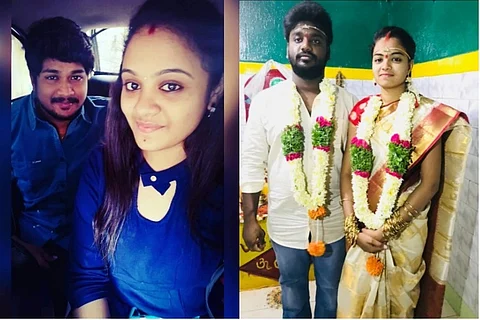

As news of two horrific caste crimes sent shockwaves across Telangana, Hyderabad-based Dalit activists have called for stronger mechanisms to protect inter-caste couples. Many are calling to put stringent laws in place to ensure no harm come to these couples from vengeful family members.
On September 14, 24-year-old Pranay, a Dalit Christian, was murdered for marrying a caste Hindu woman in Nalgona. Less than a week later, Madhavi, 20 years old, was attacked by her father for marrying Sandeep, a Dalit. Madhavi is presently in critical condition at Yashoda Hospital in Hyderabad, whereas Sandeep, who was also attacked in the brutal hacking, sustained a wound to his face.
"We helped an interfaith couple get married this Monday; their parents were not supportive and so they reached out to us. For couples entering into inter-caste or inter-faith marriages, the only support system that exists for them are civil society groups. The need of the hour is a law that will give them the protection they require, " said Sandhya, president of Progressive Organisation of Women (POW).
"There has been a spike in caste killings in the past five years," she added.
At present, there are two schemes meant to promote inter-caste marriages, the Inter-caste Marriage Scheme executed by the state that is partly funded by the Centre and the Dr Ambedkar Scheme for Social Integration under the Ministry of Social Justice and Empowerment.
Both schemes come with their own set of rules and offer financial assistance to the couples. But there exists no form of protection for the couples from their family members.
Now, families of both couples are called for counselling to the local police station once they register their marriage. The task of counselling the family members rests on the police personnel themselves.
The families of both Pranay and Amrutha, and Madhavi and Sandeep, attended the counselling and said they would accept the marriage. However, Amrutha’s father hired a killer to murder Pranay, and Madhavi’s father violently attacked her in a busy road.
"There are no safety nets for the couples. Putting up an inter-caste couple’s marriage details on the notice boards of sub-registrar offices at their own localities exposes them to threats; there is a need for a law to protect their privacy. There are schemes that promote inter-caste marriages, but the rules of the scheme make them difficult to avail, and they do not offer any protection, job security or any other incentives," said Bhaskar Kadigalla, state president for the Kula Vivaksha Porata Samithi.
"A couple has to offer proof of residence to register their marriage, and it can only be done at the sub-registrar’s office of the locality where they reside. The marriage cannot be registered anywhere else in the country; this clause has to be reworked," he added.
Even the Inter-caste Marriage Scheme gives the couple just Rs 50,000, the Dr Ambedkar Scheme for Social Integration offers the couple Rs 2.5 lakh.
In Telangana, 1,009 inter-caste couples availed the Inter-caste Marriage Scheme in 2017, but this number dropped to a mere 276 in the first nine months of 2018, reported The New Indian Express.
The Dr Ambedkar Scheme for Social Integration came into existence three years ago and has managed to benefit just 126 couples from across India, according to a Government of India press release. The poor response to the Central schemes has been attributed to the stringent rules one must follow to avail them.
"These schemes have rules such as getting a recommendation letter from a local MLA, MP or Collector. Let's not forget that a local MLA Vemula Vereesam allegedly played a role in Pranay's murder. The Tamil Nadu state government proactively provided Gowsalya legal assistance when her husband Shankar was murdered in a caste killing. There has been no such gesture from the Telangana government so far. The state government has created various government bodies for the welfare of SC/STs in the state, but there are no governing bodies that protect these couples. Pranay's murder could have been prevented had there been such a government body," said Bhaskar.
Caste killings are not new to Telangana, says the CPI(M)-affiliated Inter-Caste Marriages Federation.
"There have been over 13 documented cases of caste killings due to inter-caste marriages since the formation of Telangana," said T Skylab Babu, president of the federation.